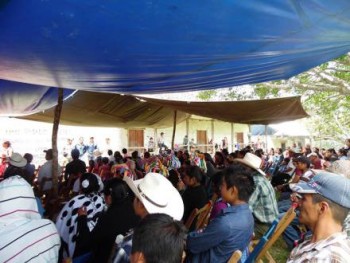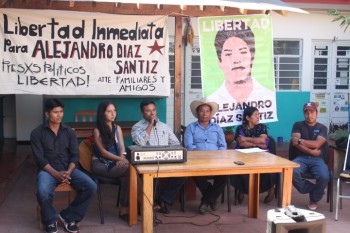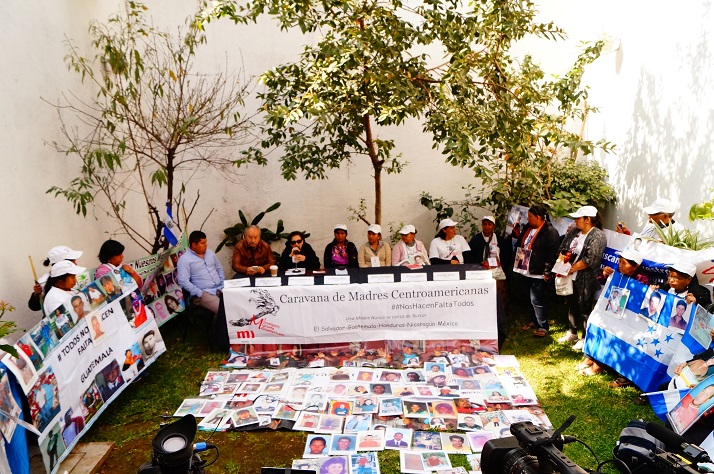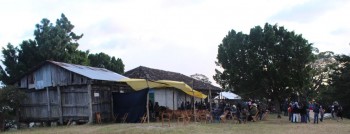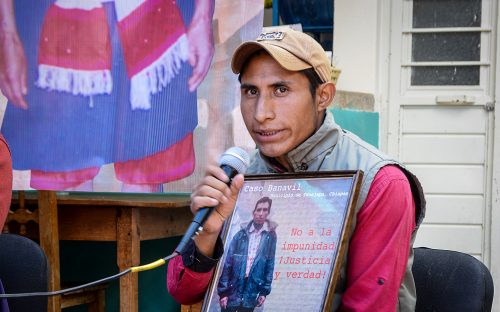
Multimedia
(Español) San Isidro los Laureles recupera tierras que trabajaron sus padres y abuelos, como “peones acasillados”.
Entrevista a miembro de San Isidro los Laureles sobre la recuperación de tierras:
[podcast]https://radiozapatista.org/Audios/TomaDeTierras-sanIsidroLosLaureles.mp3[/podcast]
Sobre el trabajo como cortadores de caña:
[podcast]https://radiozapatista.org/Audios/CortadoresDeCaa-SanIsidroLosLaureles.mp3[/podcast]
Primer pronunciamiento
Decidimos recuperar la tierra.
San Isidro Los Laureles, municipio de Venustiano Carranza, Chiapas.
A las organizaciones autónomas de México
A las organizaciones nacionales e internacionales
A los compañeros, compañeras adherentes a la Sexta Declaración de la Selva Lacandona
A los compañeros del EZLN
Al Congreso Nacional Indigena
El Día 20 de diciembre del 2015, a las 11 am, decidimos recuperar los ranchos de los que dicen ser propietarios, Francisco Ruiz, Rodrigo Ruiz, Octavin Albores, que es el municipio de Venustiano Carranza, Chiapas.
Porque estas tierras las trabajaron nuestros abuelos, abuelas, padres que eran peones acasillados. Desde el año 1940 han trabajado con un sueldo mínimo, nunca les han dado prestaciones y aguinaldos. Por nuestras familias, porque ya no tenemos donde vivir o trabajar para el sustento de las familias como indígenas, recuperamos las tierras.
Pedimos que se solidaricen las demás organizaciones autónomas de México y otras instancias con nuestra lucha justa, de donde vivir, donde trabajar, para el sustento de nuestras familias.
Un revolucionario, si no actúa con dignidad, no es revolucionario.
San Isidro los Laureles, integrante de la organización Semilla Digna, Adherentes a la Sexta Declaración de la Selva Lacandona del EZLN.
(Español) Familiares y amigos de Alejandro Díaz Sántiz denuncian su situación carcelaria
San Cristóbal de Las Casas, 14 de diciembre. Familiares, ex presxs, amigxs y compañerxs de Alejandro Díaz Sántiz denunciaron en conferencia de prensa las condiciones carcelarias que sufre Alejandro tras su traslado al penal de máxima seguridad de Villa Comaltitlán el pasado 10 de septiembre, en un operativo de más de 2 mil policías que reubicó a 400 detenidos de diferentes penales.
Alejandro Díaz Santiz, indígena tzotzil de 35 años, está preso desde el 1999 acusado de un homicidio que no cometió; al momento del arresto no hablaba español, fue torturado, nunca tuvo acceso a traductor y no contaba con dinero suficiente para una defensa legal adecuada.
Como los demás presos en dicho penal, Alejandro se encuentra en condiciones de aislamiento, con un régimen de comunicación muy limitada con el exterior, recluido todo el día en su celda, con derecho a sólo 30 minutos de patio al día, sin acceso a lecturas, imágenes, papel y lápiz y mucho menos a correspondencia. Además, el desplazamiento hasta Villa Comatitlán, a 9 horas de distancia de su lugar de residencia, es muy costoso para la familia. Siendo que el delito del que se le acusa no es federal, su traslado al CEFERESO es una irregularidad.
Los familiares y amigos de Alejandro refirieron también una larga lista de denuncias sobre la construcción del CEFERESO (uno de los penales más privatizados del país), que inició en 2014 con un costo de 4 mil 400 millones de pesos. Por todo lo anterior exigieron la liberación inmediata de Alejandro Díaz Sántiz.
(Lee abajo la denuncia completa. Lee también el pronunciamiento de varios colectivos y organizaciones nacionales e internacionales.)
A continuación, el audio de la conferencia de prensa:
[podcast]https://radiozapatista.org/Audios/2015-12-14-conf-prensa-alejandro.mp3[/podcast]
